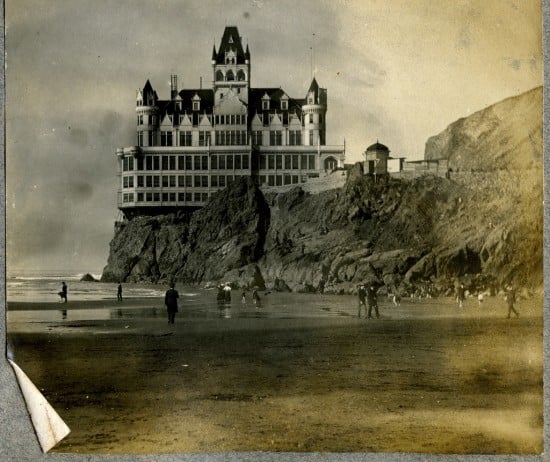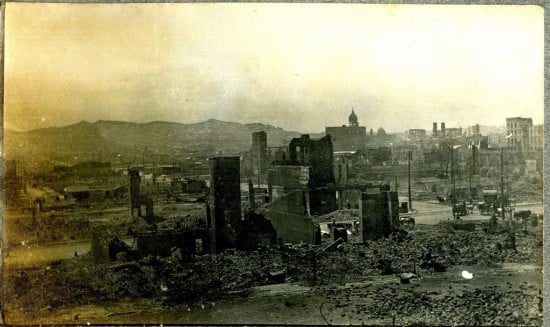The Scarlet Plague (1)
By:
January 19, 2012

HILOBROW is pleased to present the first installment of our serialization of Jack London’s The Scarlet Plague. New installments will appear each Thursday for 12 weeks.
London’s post-apocalyptic novel is partly set in 2013; 2012 marks the centennial of its first serialization. In May, HiLoBooks will publish a beautiful new edition of The Scarlet Plague, checked against the 1915 first published edition (Macmillan), with an introduction by science fiction author (and HiLobrow cofounder) Matthew Battles. NOW AVAILABLE FOR PRE-ORDERING.
SUBSCRIBE to HILOBROW’s serialized fiction via RSS.
ALL EXCERPTS: 1 | 2 | 3 | 4 | 5 | 6 | 7 | 8 | 9 | 10 | 11 | 12
CHAPTER ONE (excerpt 1 of 2)
The way led along upon what had once been the embankment of a railroad. But no train had run upon it for many years. The forest on either side swelled up the slopes of the embankment and crested across it in a green wave of trees and bushes. The trail was as narrow as a man’s body, and was no more than a wild-animal runway. Occasionally, a piece of rusty iron, showing through the forest-mould, advertised that the rail and the ties still remained. In one place, a ten-inch tree, bursting through at a connection, had lifted the end of a rail clearly into view. The tie had evidently followed the rail, held to it by the spike long enough for its bed to be filled with gravel and rotten leaves, so that now the crumbling, rotten timber thrust itself up at a curious slant. Old as the road was, it was manifest that it had been of the mono-rail type.
An old man and a boy travelled along this runway. They moved slowly, for the old man was very old, a touch of palsy made his movements tremulous, and he leaned heavily upon his staff. A rude skull-cap of goat-skin protected his head from the sun. From beneath this fell a scant fringe of stained and dirty-white hair. A visor, ingeniously made from a large leaf, shielded his eyes, and from under this he peered at the way of his feet on the trail. His beard, which should have been snow-white but which showed the same weather-wear and camp-stain as his hair, fell nearly to his waist in a great tangled mass. About his chest and shoulders hung a single, mangy garment of goat-skin. His arms and legs, withered and skinny, betokened extreme age, as well as did their sunburn and scars and scratches betoken long years of exposure to the elements.

The boy, who led the way, checking the eagerness of his muscles to the slow progress of the elder, likewise wore a single garment — a ragged-edged piece of bear-skin, with a hole in the middle through which he had thrust his head. He could not have been more than twelve years old. Tucked coquettishly over one ear was the freshly severed tail of a pig. In one hand he carried a medium-sized bow and an arrow. On his back was a quiverful of arrows. From a sheath hanging about his neck on a thong, projected the battered handle of a hunting knife. He was as brown as a berry, and walked softly, with almost a catlike tread. In marked contrast with his sunburned skin were his eyes — blue, deep blue, but keen and sharp as a pair of gimlets. They seemed to bore into all about him in a way that was habitual. As he went along he smelled things, as well, his distended, quivering nostrils carrying to his brain an endless series of messages from the outside world. Also, his hearing was acute, and had been so trained that it operated automatically. Without conscious effort, he heard all the slight sounds in the apparent quiet — heard, and differentiated, and classified these sounds — whether they were of the wind rustling the leaves, of the humming of bees and gnats, of the distant rumble of the sea that drifted to him only in lulls, or of the gopher, just under his foot, shoving a pouchful of earth into the entrance of his hole.
Suddenly he became alertly tense. Sound, sight, and odor had given him a simultaneous warning. His hand went back to the old man, touching him, and the pair stood still. Ahead, at one side of the top of the embankment, arose a crackling sound, and the boy’s gaze was fixed on the tops of the agitated bushes. Then a large bear, a grizzly, crashed into view, and likewise stopped abruptly, at sight of the humans. He did not like them, and growled querulously. Slowly the boy fitted the arrow to the bow, and slowly he pulled the bowstring taut. But he never removed his eyes from the bear. The old man peered from under his green leaf at the danger, and stood as quietly as the boy. For a few seconds this mutual scrutinizing went on; then, the bear betraying a growing irritability, the boy, with a movement of his head, indicated that the old man must step aside from the trail and go down the embankment. The boy followed, going backward, still holding the bow taut and ready. They waited till a crashing among the bushes from the opposite side of the embankment told them the bear had gone on. The boy grinned as he led back to the trail.
“A big un, Granser,” he chuckled.
The old man shook his head.

“They get thicker every day,” he complained in a thin, undependable falsetto. “Who’d have thought I’d live to see the time when a man would be afraid of his life on the way to the Cliff House. When I was a boy, Edwin, men and women and little babies used to come out here from San Francisco by tens of thousands on a nice day. And there weren’t any bears then. No, sir. They used to pay money to look at them in cages, they were that rare.”
“What is money, Granser?”
Before the old man could answer, the boy recollected and triumphantly shoved his hand into a pouch under his bear-skin and pulled forth a battered and tarnished silver dollar. The old man’s eyes glistened, as he held the coin close to them.
“I can’t see,” he muttered. “You look and see if you can make out the date, Edwin.”
The boy laughed.
“You’re a great Granser,” he cried delightedly, “always making believe them little marks mean something.”
The old man manifested an accustomed chagrin as he brought the coin back again close to his own eyes.
“2012,” he shrilled, and then fell to cackling grotesquely. “That was the year Morgan the Fifth was appointed President of the United States by the Board of Magnates. It must have been one of the last coins minted, for the Scarlet Death came in 2013. Lord! Lord!— think of it! Sixty years ago, and I am the only person alive to-day that lived in those times. Where did you find it, Edwin?”
The boy, who had been regarding him with the tolerant curiousness one accords to the prattlings of the feeble-minded, answered promptly.
“I got it off of Hoo-Hoo. He found it when we was herdin’ goats down near San José last spring. Hoo-Hoo said it was money. Ain’t you hungry, Granser?”
The ancient caught his staff in a tighter grip and urged along the trail, his old eyes shining greedily.
“I hope Har-Lip’s found a crab… or two,” he mumbled. “They’re good eating, crabs, mighty good eating when you’ve no more teeth and you’ve got grandsons that love their old grandsire and make a point of catching crabs for him. When I was a boy —”

But Edwin, suddenly stopped by what he saw, was drawing the bowstring on a fitted arrow. He had paused on the brink of a crevasse in the embankment. An ancient culvert had here washed out, and the stream, no longer confined, had cut a passage through the fill. On the opposite side, the end of a rail projected and overhung. It showed rustily through the creeping vines which overran it. Beyond, crouching by a bush, a rabbit looked across at him in trembling hesitancy. Fully fifty feet was the distance, but the arrow flashed true; and the transfixed rabbit, crying out in sudden fright and hurt, struggled painfully away into the brush. The boy himself was a flash of brown skin and flying fur as he bounded down the steep wall of the gap and up the other side. His lean muscles were springs of steel that released into graceful and efficient action. A hundred feet beyond, in a tangle of bushes, he overtook the wounded creature, knocked its head on a convenient tree-trunk, and turned it over to Granser to carry.
“Rabbit is good, very good,” the ancient quavered, “but when it comes to a toothsome delicacy I prefer crab. When I was a boy —”
“Why do you say so much that ain’t got no sense?” Edwin impatiently interrupted the other’s threatened garrulousness.
The boy did not exactly utter these words, but something that remotely resembled them and that was more guttural and explosive and economical of qualifying phrases. His speech showed distant kinship with that of the old man, and the latter’s speech was approximately an English that had gone through a bath of corrupt usage.
“What I want to know,” Edwin continued, “is why you call crab ‘toothsome delicacy’? Crab is crab, ain’t it? No one I never heard calls it such funny things.”

The old man sighed but did not answer, and they moved on in silence. The surf grew suddenly louder, as they emerged from the forest upon a stretch of sand dunes bordering the sea. A few goats were browsing among the sandy hillocks, and a skin-clad boy, aided by a wolfish-looking dog that was only faintly reminiscent of a collie, was watching them. Mingled with the roar of the surf was a continuous, deep-throated barking or bellowing, which came from a cluster of jagged rocks a hundred yards out from shore. Here huge sea-lions hauled themselves up to lie in the sun or battle with one another. In the immediate foreground arose the smoke of a fire, tended by a third savage-looking boy. Crouched near him were several wolfish dogs similar to the one that guarded the goats.
The old man accelerated his pace, sniffing eagerly as he neared the fire.
“Mussels!” he muttered ecstatically. “Mussels! And ain’t that a crab, Hoo-Hoo? Ain’t that a crab? My, my, you boys are good to your old grandsire.”
Hoo-Hoo, who was apparently of the same age as Edwin, grinned.
“All you want, Granser. I got four.”
The old man’s palsied eagerness was pitiful. Sitting down in the sand as quickly as his stiff limbs would let him, he poked a large rock-mussel from out of the coals. The heat had forced its shells apart, and the meat, salmon-colored, was thoroughly cooked. Between thumb and forefinger, in trembling haste, he caught the morsel and carried it to his mouth. But it was too hot, and the next moment was violently ejected. The old man spluttered with the pain, and tears ran out of his eyes and down his cheeks.
The boys were true savages, possessing only the cruel humor of the savage. To them the incident was excruciatingly funny, and they burst into loud laughter. Hoo-Hoo danced up and down, while Edwin rolled gleefully on the ground. The boy with the goats came running to join in the fun.
“Set ’em to cool, Edwin, set ’em to cool,” the old man besought, in the midst of his grief, making no attempt to wipe away the tears that still flowed from his eyes. “And cool a crab, Edwin, too. You know your grandsire likes crabs.”
From the coals arose a great sizzling, which proceeded from the many mussels bursting open their shells and exuding their moisture. They were large shellfish, running from three to six inches in length. The boys raked them out with sticks and placed them on a large piece of driftwood to cool.
“When I was a boy, we did not laugh at our elders; we respected them.”
The boys took no notice, and Granser continued to babble an incoherent flow of complaint and censure. But this time he was more careful, and did not burn his mouth. All began to eat, using nothing but their hands and making loud mouth-noises and lip-smackings. The third boy, who was called Hare-Lip, slyly deposited a pinch of sand on a mussel the ancient was carrying to his mouth; and when the grit of it bit into the old fellow’s mucous membrane and gums, the laughter was again uproarious. He was unaware that a joke had been played on him, and spluttered and spat until Edwin, relenting, gave him a gourd of fresh water with which to wash out his mouth.
“Where’s them crabs, Hoo-Hoo?” Edwin demanded. “Granser’s set upon having a snack.”
NEXT WEEK: “Where four million people disported themselves, the wild wolves roam to-day, and the savage progeny of our loins, with prehistoric weapons, defend themselves against the fanged despoilers. Think of it! And all because of the Scarlet Death —”
NOTE: In this first chapter, the old man calls one of the boys “Har-Lip.” Subsequently, in this and the book’s other chapters, the boy is called “Hare-Lip.” Typo? Or dialect?
RADIUM AGE SCIENCE FICTION: “Radium Age” is HILOBROW’s name for the 1904–33 era, which saw the discovery of radioactivity, the revelation that matter itself is constantly in movement — a fitting metaphor for the first decades of the 20th century, during which old scientific, religious, political, and social certainties were shattered. This era also saw the publication of genre-shattering writing by Edgar Rice Burroughs, Sax Rohmer, E.E. “Doc” Smith, Jack London, Arthur Conan Doyle, Aldous Huxley, Olaf Stapledon, Karel Čapek, H.P. Lovecraft, Charlotte Perkins Gilman, Yevgeny Zamyatin, Philip Gordon Wylie, and other pioneers of post-Verne/Wells, pre-Golden Age “science fiction.” More info here.
HILOBOOKS: The mission of HiLoBooks is to serialize novels on HiLobrow; and also, as of 2012, operating as an imprint of Richard Nash’s Cursor, to reissue Radium Age science fiction in beautiful new print editions. So far, we have published Jack London’s The Scarlet Plague, Rudyard Kipling’s With the Night Mail (and “As Easy as A.B.C.”), Arthur Conan Doyle’s The Poison Belt, H. Rider Haggard’s When the World Shook, Edward Shanks’s The People of the Ruins, William Hope Hodgson’s The Night Land, and J.D. Beresford’s Goslings. Forthcoming: E.V. Odle’s The Clockwork Man, Cicely Hamilton’s Theodore Savage, and Muriel Jaeger’s The Man with Six Senses. For more information, visit the HiLoBooks homepage.
OUR THANKS: to io9, the Wall Street Journal blog Ideas Market, NPR’s Science Friday blog, Comic Critique, and others for talking up our project. And thanks, Twitter, for the HiLoBooks love.
READ: You are reading Jack London’s The Scarlet Plague. Also read our serialization of: Rudyard Kipling’s With the Night Mail | H. Rider Haggard’s When The World Shook
ORIGINAL FICTION: HILOBROW has serialized three novels: James Parker’s The Ballad of Cocky The Fox (“a proof-of-concept that serialization can work on the Internet” — The Atlantic) and Karinne Keithley Syers’s Linda Linda Linda. We also publish original stories and comics.
